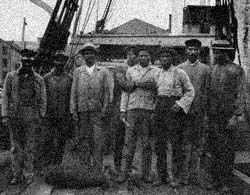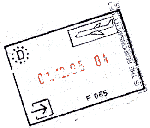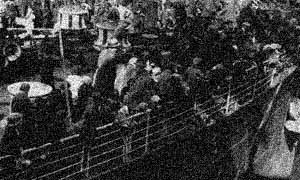A Ten Day Summer Institute for Teachers
| New Bedford is
a city that has seen the rise and fall of commercial
activity of global proportions with the whaling industry
of the 19th century and textiles into the 20th century.
It is an old industrial city with high unemployment and
environmental issues today. The process of examining the
underlying causality naturally starts in the early grades
through exploration of "what's in our own back
yard" to subsequent understanding of processes and
systems, i.e. a sense of relationships and finally, in
the higher grades to informed decision making and
proaction for a better quality of life. Participants will
have many options for connecting the Content Institute to
their lives whether through their own maritime heritage,
family stories of immigration, or commerce during the
design phase of the Institute. During the Institute,
participants will step back into a specific time period
and research the perceptions of people at that time. PDP's and Graduate Credit from UMASS Dartmouth available. Call Laura Periera at the New Bedford Whaling Museum, 508-997-0046 x14 for application materials. |
 |

 Portraits
of a Port will be offered to school-based teams of participants
concurrently addressing the history, geography and economics
strands and learning standards of the Curriculum Frameworks.
Teams will look at regional, statewide and world history through
the portal of New Bedford while incorporating geography and
economics of the day. The Institute will use the world
class archival resources in the City of New Bedford including the
New Bedford Whaling Museum, Rotch Jones Duff House, New Bedford
Historical Society and New Bedford Public Library as well as the
hands on experience aboard the century-old Grand Banks fisherman,
Arctic explorer and Cape Verdean immigration packet, Ernestina
ex-Effie M. Morrissey. The teams will develop content areas and
"tool kits" of resources while implementing the new
statewide curriculum frameworks ashore and then come aboard
Schooner Ernestina to sail together for three days while
continuing research and curriculum development as well as to work
on the interdisciplinary connections and grade transitions.
Portraits
of a Port will be offered to school-based teams of participants
concurrently addressing the history, geography and economics
strands and learning standards of the Curriculum Frameworks.
Teams will look at regional, statewide and world history through
the portal of New Bedford while incorporating geography and
economics of the day. The Institute will use the world
class archival resources in the City of New Bedford including the
New Bedford Whaling Museum, Rotch Jones Duff House, New Bedford
Historical Society and New Bedford Public Library as well as the
hands on experience aboard the century-old Grand Banks fisherman,
Arctic explorer and Cape Verdean immigration packet, Ernestina
ex-Effie M. Morrissey. The teams will develop content areas and
"tool kits" of resources while implementing the new
statewide curriculum frameworks ashore and then come aboard
Schooner Ernestina to sail together for three days while
continuing research and curriculum development as well as to work
on the interdisciplinary connections and grade transitions.

 Resources available to participants will
include photographs, logs, texts, press articles, and world class
archive at the Whaling Museum and Public Library, etc. as well as
historic homes and the historic Schooner Ernestina. In addition,
participants will experience by doing when aboard the Schooner
Ernestina sailing as our forebears at the turn of the century and
before. Art, music and the arts offered through the partnership
for the Institute as well as the math and science and technology
to be experienced on Ernestina provide numerous opportunities for
examination of connections.
Resources available to participants will
include photographs, logs, texts, press articles, and world class
archive at the Whaling Museum and Public Library, etc. as well as
historic homes and the historic Schooner Ernestina. In addition,
participants will experience by doing when aboard the Schooner
Ernestina sailing as our forebears at the turn of the century and
before. Art, music and the arts offered through the partnership
for the Institute as well as the math and science and technology
to be experienced on Ernestina provide numerous opportunities for
examination of connections.  Expertise
of the curatorial staff of the New Bedford Whaling Museum, New
Bedford Historical Society, Waterfront Historic Area League and
New Bedford Public Library as well as Ernestina staff experts on
the Cape Verdean packet trade will offer support and guidance as
necessary as participants design and implement a research project
during the Institute.
Expertise
of the curatorial staff of the New Bedford Whaling Museum, New
Bedford Historical Society, Waterfront Historic Area League and
New Bedford Public Library as well as Ernestina staff experts on
the Cape Verdean packet trade will offer support and guidance as
necessary as participants design and implement a research project
during the Institute.
The Institute is divided into five interconnected segments:
 Evaluations will be based on journals,
individual and/or group presentations and pre- and
post-evaluation instruments for teachers. Throughout the Summer
Content Institute, assessment measures will be modeled by the
teacher-participants. Participants will develop an assessment
model for the classroom based on institute experience utilizing
similar instruments to those listed above.
Evaluations will be based on journals,
individual and/or group presentations and pre- and
post-evaluation instruments for teachers. Throughout the Summer
Content Institute, assessment measures will be modeled by the
teacher-participants. Participants will develop an assessment
model for the classroom based on institute experience utilizing
similar instruments to those listed above.